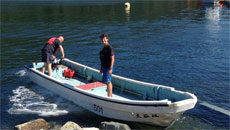TORONTO - A pair of large international studies are questioning the validity of the notion that the less salt a person consumes, the better. In fact, the Canadian-led research suggests too little salt in the diet may even be a bad thing.
The studies, published Wednesday in the New England Journal of Medicine, involved more than 100,000 people in 18 countries and assessed daily sodium and potassium intake, relating them to blood pressure levels and to the risk of heart disease, strokes and deaths.
On average, Canadians ingest between 3.5 and four grams of sodium per day, but some guidelines have recommended lowering daily intake to less than 2.3 grams per day, a level the researchers say has been attained by less than five per cent of the population, both in Canada and around the world.
In 2010, a 25-member sodium working group chaired by Health Canada advised Canadian adults to try to cut salt consumption by a third so they could reach a maximum of 2.3 grams a day by 2016. The group said 1.5 grams daily is considered adequate intake.
Hypertension Canada, an organization of about 70 health professionals from across the country, had recommended that teens and adults limit sodium intake to between 1.2 and 1.5 grams, depending on age. But last October, it raised that amount to two grams, the equivalent of roughly five millilitres (one teaspoon) of salt, after reviewing the latest research on the effects of dietary sodium on blood pressure.
The Prospective Urban Rural (PURE) study, led by investigators at McMaster University, shows that a dietary sodium level exceeding five grams per day does indeed raise blood pressure, especially among people who already have hypertension and those age 55 and older. High blood pressure, or hypertension, is a known risk factor for heart attack, heart failure, stroke and other disorders.
But cardiologist Dr. Salim Yusuf, principal researcher of the two studies, said the effects of blood pressure are more modest at average levels of sodium consumption — three to five grams per day — and not obvious at amounts below three grams, which is under the maximum intake recommended by many guidelines.
"It makes sense if your blood pressure is high, your sodium intake is high, to lower sodium," Yusuf said Wednesday from Hamilton. "But what is often ignored is that increasing your potassium intake by eating healthy foods is also beneficial and just as important, and the two together is your best strategy."
Bananas, avocados, sweet potatoes, green leafy vegetables and legumes are just some of the foods rich in potassium.
"A balanced approach is what is likely to have the greatest benefit in lowering blood pressure," said Andrew Mente, an assistant professor of clinical epidemiology and biostatistics, and lead author of the first paper. "This can be achieved by moderation in salt intake, combined with eating lots of fruits and vegetables."
While ingesting too much sodium, either by dosing meals from a salt shaker or eating an abundance of processed foods, can pose serious health risks, the researchers' companion study suggests that getting too little salt also may be dangerous.
"The second paper shows that increased sodium intake, over six grams a day or even five grams a day, is certainly associated with an increased risk of heart disease, strokes and death," said Yusuf. "And so once somebody's intake is above that, it makes sense to lower it."
But the population-based study found that with ingested daily sodium levels between three and five to six grams, there was a lower risk of cardiovascular events and death, as compared with either a higher or lower level of salt in the diet.
In people whose average daily sodium intake is less than three grams — so below the amount recommended by many guidelines — the study found an elevated risk of heart attack, stroke and other serious cardiovascular problems, he said.
"So it makes no sense, then, to try to lower that."
Lead author Martin O'Donnell, an associate clinical professor at McMaster and National University of Ireland in Galway, said low sodium levels in the body can boost certain hormones that are related to a higher risk of cardiovascular disease and death.
"The key question is whether these competing physiologic effects result in net clinical benefit or not," said O'Donnell. "In the PURE study, we found the lowest risk of death and cardiovascular events in those who consumed moderate amounts of sodium intake (three to six grams per day), with an increased risk above and below that range.
"While this finding has been reported in previous smaller studies, PURE is the largest international study to study sodium intake and health outcomes, and adds considerable strength to the contention that moderate sodium intake is optimal."
Yusuf said the studies' findings question the much-touted notion that salt is unhealthy and that consumers and the food industry should severely cut sodium content in food.
But he said that contention — and the guidelines it spawned — are based on a paucity of scientific evidence.
"They were done with a modest degree of evidence that sodium reduction lowers blood pressure, and then people just extrapolated all the way down to levels at which we had very little data ... The guidelines were done with practically no evidence that sodium reduction reduces cardiovascular disease."
The gold standard for such scientific evidence is a clinical trial, in which participants are randomly assigned to receive different interventions. In a medication trial, for instance, half the subjects would be given the experimental drug being studied, while the other half would get a dummy pill. The effects would then be compared.
That's an approach endorsed by Prof. Suzanne Oparil, director of the Vascular Biology and Hypertension Program at the University of Birmingham, Ala. In an accompanying editorial, she says randomized trials are needed to compare outcomes in people with typical daily salt consumption versus very low salt intake to determine if reducing sodium leads to fewer heart attacks, strokes and deaths.
"These provocative findings beg for a randomized, controlled outcome trial to compare reduced sodium intake with usual diet," Oparil writes of the PURE studies. "In the absence of such a trial, the results argue against reduction of dietary sodium as an isolated public health recommendation."






